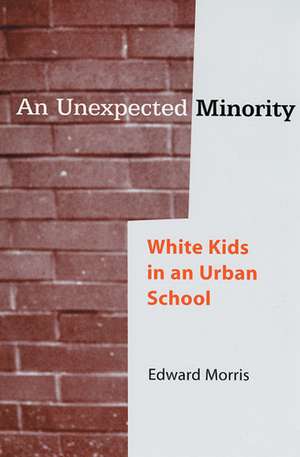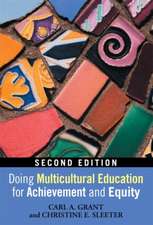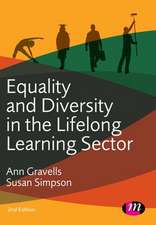An Unexpected Minority: White Kids in an Urban School
Autor Edward W. Morrisen Limba Engleză Paperback – 21 oct 2005
Racial and ethnic minority groups in the United States have been growing rapidly in recent decades. Projections based on census data indicate that, in coming years, white people will statistically dominate noticeably fewer regions and public spaces. How will this reversal of minority status affect ideas about race? In spaces dominated by people of color, will attitudes about white privilege change? Or, will deeply rooted beliefs about racial inequality be resilient to numerical shifts in strength?
In An Unexpected Minority, sociologist Edward Morris addresses these far-reaching questions by exploring attitudes about white identity in a Texas middle school composed predominantly of African Americans, Latinos, and Asians. Based on his ethnographic research, Morris argues that lower-income white students in urban schools do not necessarily maintain the sort of white privilege documented in other settings. Within the student body, African American students were more frequently the "cool" kids, and white students adopted elements of black culture-including dress, hairstyle, and language-to gain acceptance. Morris observes, however, that racial inequalities were not always reversed. Stereotypes that cast white students as better behaved and more academically gifted were often reinforced, even by African American teachers.
Providing a new and timely perspective to the significant role that non-whites play in the construction of attitudes about whiteness, this book takes an important step in advancing the discussion of racial inequality and its future in this country.
In An Unexpected Minority, sociologist Edward Morris addresses these far-reaching questions by exploring attitudes about white identity in a Texas middle school composed predominantly of African Americans, Latinos, and Asians. Based on his ethnographic research, Morris argues that lower-income white students in urban schools do not necessarily maintain the sort of white privilege documented in other settings. Within the student body, African American students were more frequently the "cool" kids, and white students adopted elements of black culture-including dress, hairstyle, and language-to gain acceptance. Morris observes, however, that racial inequalities were not always reversed. Stereotypes that cast white students as better behaved and more academically gifted were often reinforced, even by African American teachers.
Providing a new and timely perspective to the significant role that non-whites play in the construction of attitudes about whiteness, this book takes an important step in advancing the discussion of racial inequality and its future in this country.
Preț: 285.09 lei
Nou
Puncte Express: 428
Preț estimativ în valută:
54.55€ • 56.37$ • 45.38£
54.55€ • 56.37$ • 45.38£
Carte tipărită la comandă
Livrare economică 19 martie-02 aprilie
Preluare comenzi: 021 569.72.76
Specificații
ISBN-13: 9780813537214
ISBN-10: 0813537215
Pagini: 192
Dimensiuni: 152 x 229 x 13 mm
Greutate: 0.28 kg
Ediția:None
Editura: Rutgers University Press
Colecția Rutgers University Press
ISBN-10: 0813537215
Pagini: 192
Dimensiuni: 152 x 229 x 13 mm
Greutate: 0.28 kg
Ediția:None
Editura: Rutgers University Press
Colecția Rutgers University Press
Notă biografică
Edward Morris is an assistant professor of sociology at Ohio University in Athens.
Cuprins
Understanding white advantages in education and society
Matthews Middle School in historical and contemporary context
"Tuck in that shirt!" race, class, gender and discipline
From "middle-class" to "trailer trash:" teachers' perceptions of white students
"White chocolate:" meanings and boundaries of whiteness in the peer culture
Matthews Middle School in historical and contemporary context
"Tuck in that shirt!" race, class, gender and discipline
From "middle-class" to "trailer trash:" teachers' perceptions of white students
"White chocolate:" meanings and boundaries of whiteness in the peer culture
Recenzii
An Unexpected Minority is a thoughtful and engaged story of how race gets lived and negotiated in school. The book illuminates the persistent benefits of whiteness for white students, even in a setting where they are a numerical minority and also highlights the struggle for these same students to carve out a place for themselves in a setting where they are rendered problematic.
An enlightening analysis of the meaning and significance of whiteness in a setting where whites are the minority. Required reading for those committed to the pursuit of racial justice in education.
An unusually perceptive and interesting analysis of changing constructions of whiteness, and of the ways in which social class and gender may inflect perceptions of racial ethnicity. A significant contribution to the literature on schooling.
Descriere
In An Unexpected Minority, sociologist Edward Morris addresses these far-reaching questions by exploring attitudes about white identity in a Texas middle school composed predominantly of African Americans, Latinos, and Asians. Based on his ethnographic research, Morris argues that lower-income white students in urban schools do not necessarily maintain the sort of white privilege documented in other settings. Within the student body, African American students were more frequently the "cool" kids, and white students adopted elements of black culture-including dress, hairstyle, and language-to gain acceptance. Morris observes, however, that racial inequalities were not always reversed. Stereotypes that cast white students as better behaved and more academically gifted were often reinforced, even by African American teachers.
Providing a new and timely perspective to the significant role that non-whites play in the construction of attitudes about whiteness, this book takes an important step in advancing the discussion of racial inequality and its future in this country.
Providing a new and timely perspective to the significant role that non-whites play in the construction of attitudes about whiteness, this book takes an important step in advancing the discussion of racial inequality and its future in this country.













